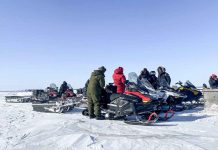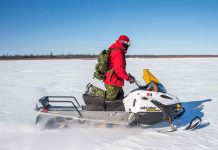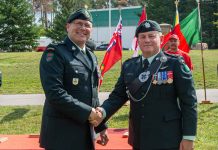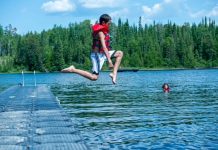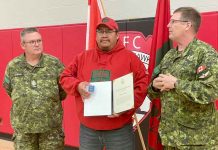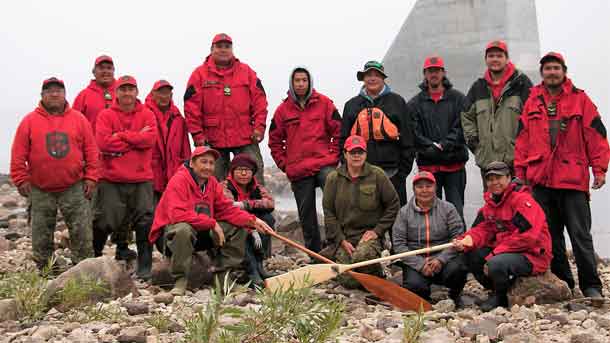

credit: Warrant Officer Carl Wolfe, Canadian Army
By Peter Moon
THUNDER BAY – Canadian Rangers from four First Nation communities in Northern Ontario have completed a challenging river patrol , travelling by canoe, and paddling 300 kilometers on a historic fur trading route on the Missinaibi River and Moose River.

credit: Sergeant Peter Moon, Canadian Rangers
“It was a very successful exercise,” said Warrant Officer Carl Wolfe, the Canadian Army instructor who led the eight-day military expedition. “It was challenging but we succeeded in dominating the rivers.”
The challenges included three days of fog and rain, temperatures that dropped to zero at night, low water, long and difficult portages, head winds, leeches, mosquitoes, and biting pine beetles.
There were 15 Rangers on the patrol, with four of them females. The Rangers, who are part-time army reservists, were from the Cree communities of Fort Albany, Kashechewan, Moose Factory, and Peawanuck. Rangers are used to boats with engines and few had extensive experience with paddling. Four of them were thrown into the water when two of the patrol’s eight canoes tipped in white water rapids.
The Missinaibi and Moose rivers are rarely travelled at this time of year because water levels drop during the summer. As a result the Rangers encountered no other travellers during their patrol.
“The trip was long and hard,” said Master Corporal Kurt Rickard of Moose Factory, “But the scenery was very beautiful. It was a trip that I definitely won’t forget. I don’t think any of us will.”
The Rangers began their patrol on the Missinaibi in Mattice, a small community 70 kilometers west of Kapuskasing. The Missinaibi is named after the Cree word for “pictured waters,” which is thought to refer to pictographs found on rock faces along the river. The Rangers used the same starting point used by voyageurs who paddled on the Missinaibi to the Moose River on their way to Moose Factory and James Bay.
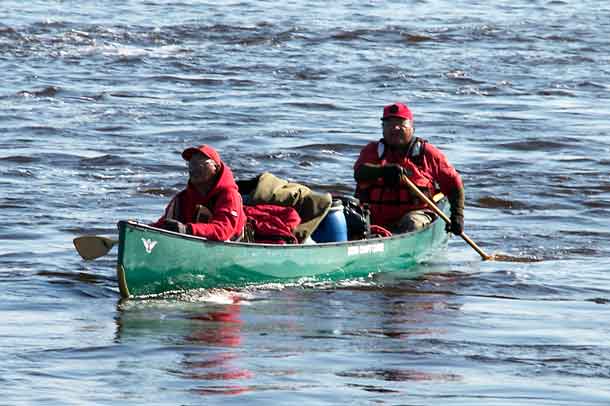
credit: Master Corporal Kurt Rickard, Canadian Rangers
“We wanted to do a surveillance patrol of the entire river system that comes to Moose Factory and look at water levels in a remote area, and to do that we had to use paddle canoes to overcome the low waters,” Warrant Officer Wolfe said. “And while we did that we also covered training subjects like navigation, communications, swift water rescue, flat water safety, hydrology, and lost person behaviour for canoe trippers.”
The Rangers had to negotiate three difficult portages. One was 1,600 metres long, the second 800 metres, and the last one was 2,300 metres.
The oldest Ranger was 72-year-old Xavier Patrick from Peawanuck. “He kept up with the younger generation and he made it look real easy,” said Sergeant Matthew Gull of Peawanuck. “He told stories of how he used to paddle when he was a young man.”
Sergeant Byron Corston of Moose Factory was equally impressed. “He’d be carrying his back pack and dragging a barrel full of food and he’d have a cigarette in his mouth doing a portage. He just blew me away. He was amazing.”
“The first day,” said Warrant Officer Wolfe, “it was sunny and then it rained for three days with headwinds, and night time temperatures of zero to five degrees. We started half a day late and we came into Moose Factory a day early. In the last two days we paddled 130 kilometers and that was against strong headwinds. Everyone learned a lot on this exercise.”
(Sergeant Peter Moon is the public affairs ranger for the 3rd Canadian Ranger Patrol Group at Canadian Forces Base Borden.)

